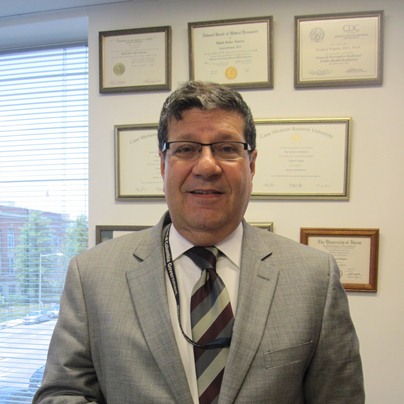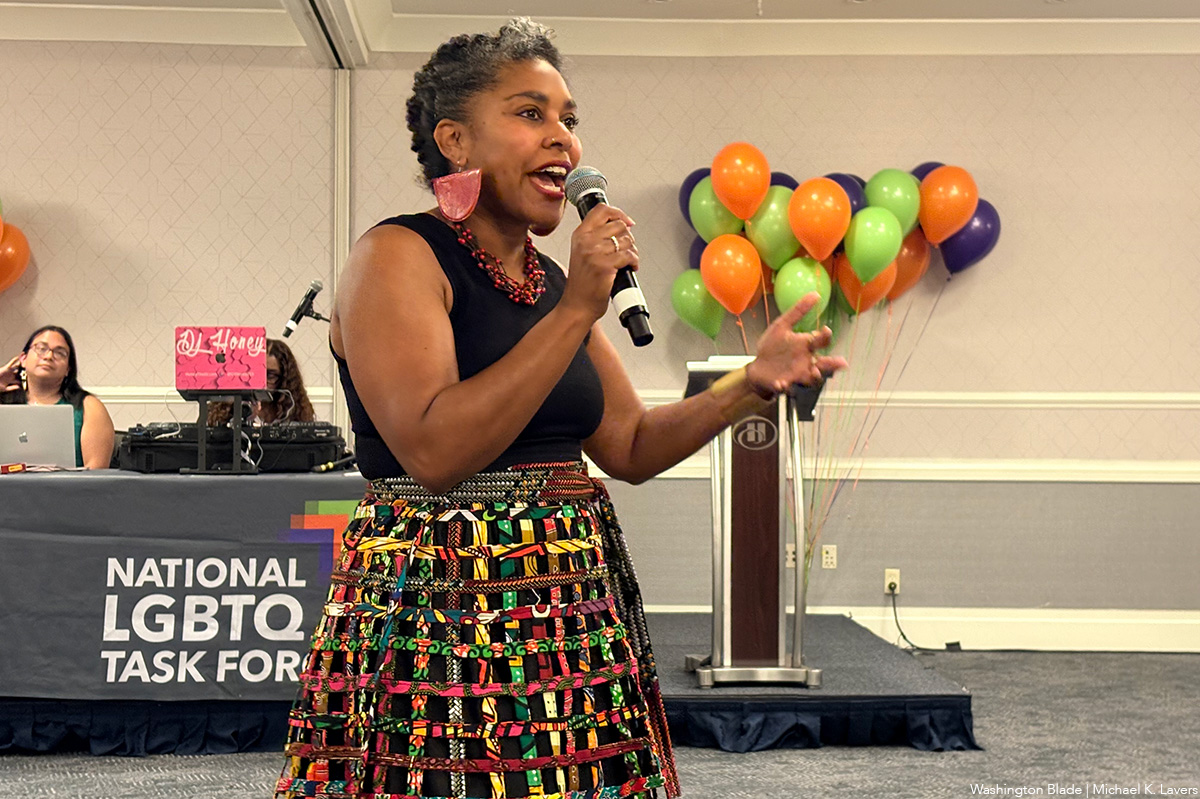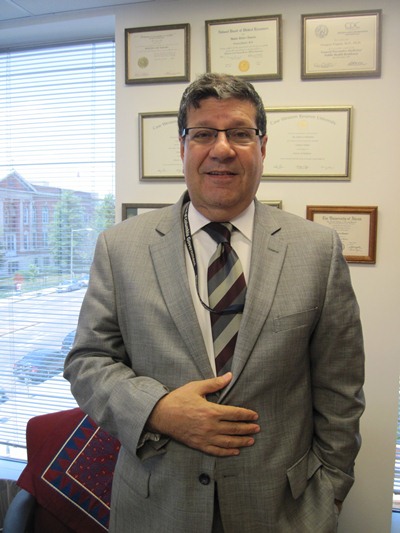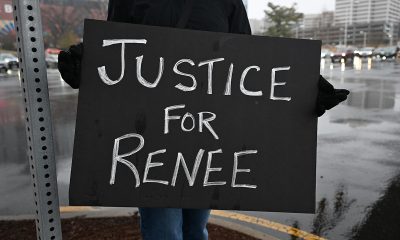Local
Pappas: D.C. making progress in fight against HIV
2.7 percent of Washingtonians were living with disease in 2010.

The head of D.C.’s response to HIV/AIDS stressed on Monday that the city continues to make progress in its fight against the epidemic.
“We’re catching people earlier in the disease,” noted Dr. Gregory Pappas, director of the Department of Health’s HIV/AIDS, Hepatitis, Sexually Transmitted Disease and Tuberculosis Administration. “It used to be everybody who was tested pretty much had AIDS or was very close to having AIDS. Now, we’re finding people earlier in the disease.”
A total of 14,465 people — or 2.7 percent — of Washingtonians were living with the virus at the end of 2010. The report further noted that African Americans remain disproportionately impacted by the epidemic with 4.3 percent of black D.C. residents living with HIV. 6.3 percent of black D.C. men had the virus, compared with 2.4 percent of whites and three percent of Latinos. DOH further noted that black women accounted for 92.4 percent of D.C. women with HIV.
The report further indicates that the number of new HIV diagnoses among black Washingtonians between 2006 and 2010 decreased 24 percent, compared to a 36 percent decrease among white D.C. residents during the same period.
Same-sex and heterosexual sexual contact remain the two leading modes of HIV transmission in the city. Slightly more than 77 percent of white D.C. residents and 55.5 percent of Latino Washingtonians who tested positive between 2006 and 2010 contracted the virus through men who have sex with men, compared to only 30.7 percent of black D.C. residents. Nearly 39 percent of black Washingtonians who tested positive during this period contracted the virus through heterosexual sexual contact.
DOH further noted that it distributed more than five million male and female condoms in 2011, and has tripled the number of publicly supported HIV tests from 2007. The city recommends that Washingtonians get tested at least once a year – and MSM have an HIV test every six months. Pappas said that one-third of D.C. residents get tested annually.
“We’re a national leader on that, but it’s way off from where we need to be,” he said.
D.C. Council member David Catania [I-At Large] introduced a bill last fall that would require doctors and other health care providers to attend HIV/AIDS workshops as part of their ongoing education requirements. Lawmakers subsequently approved the measure.
“We’re using that as a way to try and promote doctors to offer the test,” said Pappas.
In addition to increased testing, the DOH report further noted that roughly 89 percent of the 4,879 people who tested positive for the virus in D.C. between 2005 and 2009 were connected to HIV-specific care by the end of 2010. “We do well with connecting to care,” said Pappas, stressing the need for improved coordination between publicly funded clinics and HIV/AIDS community service providers. “The big problem is people don’t stay in care. And that’s where we’re falling down.”
Pappas credited the city’s needle exchange program for a 72 percent drop in HIV rates among intravenous drug users between 2007 and 2010—the city disposed of more than 340,000 syringes through its needle exchange program last year, which is an increase of 3,000 from 2010.Mortality rates for Washingtonians with HIV also fell by almost 50 percent from 2006 to 2010.
Pappas noted that half of those with HIV who die each year succumb to an unrelated illness, while the remaining 50 percent of people with the virus in D.C. die from HIV-related causes. He said liver failure associated with Hepatitis C has become one of the leading causes of death among people with HIV.
“It’s about 75 people annually, but that’s still too high in the District of Columbia,” said Pappas, referring to the city’s overall HIV mortality rate. “We can get to near zero deaths. We’ve gotten to zero new infections among kids, we can get to zero deaths or very near.”
Pappas further stressed that these HIV-related deaths once again highlight what he describes as the need for people with the virus to stay in treatment and continue to take their medication. “At this point since there’s no one in the District of Columbia that’s totally virally resistant now, right now all those people should be able to live,” he said.
D.C. preps for AIDS conference
The city continues to make final preparations for the International AIDS Conference that will kick off at the Walter E. Washington Convention Center on July 22.
HAHSTA will present 15 scientific abstracts during the five-day conference. The D.C. Center for AIDS Research, the body that coordinates HIV/AIDS-specific research in Washington, will highlight city-based research in a Global Village session that will be free and open to the public.
Mayor Vincent Gray and Maryland Gov. Martin O’Malley wrote a letter to President Obama earlier this year in support of a more regional-based strategy that Pappas said would allow neighboring jurisdictions to more effectively coordinate their responses to HIV/AIDS.
“The jurisdictions are working well together well on HIV/AIDS, but we still got a long ways to go,” he said, pointing to a lack of regional data. “I can tell you about D.C. in great detail, but when we’re talking about what’s going on around us, it’s a more difficult picture. We’ve got to look at that.”
Pappas also cited a hypothetical case of a Prince George’s County resident who may live across the street from a D.C. clinic that can have difficulties using their Maryland Medicaid to pay for HIV-related services in Washington as an example of the need for a more regional approach to fighting the epidemic. He also pointed to an estimate that treatment for a person with HIV costs $400,000 over the course of their lifetime—and the epidemic adds $1 million to D.C.’s long-term health care expenditures each day.
“Investment now will save huge amounts of money in the future,” said Pappas, referring to regional investment to combat HIV. “We can do better with the dollars we have if we coordinated better.”
District of Columbia
Faith programming remains key part of Creating Change Conference
‘Faith work is not an easy pill to swallow in LGBTQ spaces’

The National LGBTQ Task Force kicked off the 38th annual Creating Change conference in D.C. this week. This year, as with years past, faith and interfaith programming remains a key part of the conference’s mission and practice.
For some, the presence of faith work at an LGBTQ+ conference may seem antithetical, and Creating Change does not deny the history of harm caused by religious institutions. “We have to be clear that faith work is not an easy pill to swallow in LGBTQ spaces, and they’re no qualms about saying that we acknowledge the pain, trauma, and violence that’s been purported in the name of religion,” Tahil Sharma, Faith Work Director for the National LGBTQ Task Force, said.
In fact, several panels at the conference openly discuss acknowledging, healing from, and resisting religious harm as well as religious nationalism, including one scheduled today titled “Defending Democracy Through Religious Activism: A panel of experts on effective strategies for faith and multi-faith organizing” that features local queer faith activists like Ebony C. Peace, Rob Keithan, and Eric Eldritch who are also involved in the annual DC Pride Interfaith Service.
Another session will hold space for survivors of religious violence, creating “a drop-in space for loving on each other in healing ways, held by Rev. Alba Onofrio and Teo Drake.”
But Sharma and others who organized the Creating Change Conference explained that “a state of antipathy” towards religious communities, especially those that align with queer liberation and solidarity, is counterproductive and denies the rich history of queer religious activism. “It’s time for us to make a call for an approach to LGBTQ+ liberation that uses interfaith literacy as a tool rather than as a weapon against us,” Sharma explained.
Recognizing a local queer faith icon
Along with the panels, fighting religious nationalism and fostering communion with aligned faith activists and communities is at heart of this year’s faith work. As Sharma shared, “the person that we’re honoring this year for the faith award is Rev. Dr. Sofía Betancourt, and Dr. Betancourt is an amazing leader and someone who really stands out in representing UUs but also representing herself unapologetically.”
Based in the Washington, D.C. area, Dr. Betancourt has more than 20 years of experience working as a public minister, seminary professor, scholar, and environment ethicist, and public theologian. Her activism is rooted in her lived identities as a queer, multiracial, AfroLatine first-generation daughter of immigrants from Chile and Panama, and has been a critical voice in advancing the United Universalism towards anti-racist and pluralistic faith work.
Creating a faith-based gathering space
Sharma also said that faith fosters a unique space and practice to encounter grief and joy. For this reason, Sharma wants to “create a space for folks to engage in curiosity, to engage in spiritual fulfillment and grounding but also I think with the times that we’re in to lean into some space to mourn, some space to find hope.” The Many Paths Gathering Space serves this purpose, where visitors can stop for spiritual practice, speak with a Spiritual Care Team member, or just take a sensory break from the bustle of the conference.
This also means uplifting and foregrounding queer religious ephemera with an ofrenda to honor those who have passed, a display of nonbinary Korean American photographer Salgu Wissmath’s exhibition Divine Identity, and the Shower of Stoles, a collection of about 1,500 liturgical stoles and other sacred regalia representing the lives of lesbian, gay, bisexual, and transgender people of faith.
The Shower of Stoles
The collection was first started in 1995 by Martha Juillerat and Tammy Lindahl who received eighty stoles that accompanied them and lent them solace as they set aside their ordinations from the Presbyterian Church. The whole collection was first displayed at the 1996 General Assembly of the Presbyterian Church in New Mexico. The stoles, according to the Task Force, “quickly became a powerful symbol of the huge loss to the church of gifted leadership.”
Each stole represents the story of a queer person who is active in the life and leadership of their faith community, often sent in by the people themselves but sometimes by a loved one in their honor. About one third of all the stoles are donated anonymously, and over three-quarters of the stoles donated by clergy and full-time church professionals are contributed anonymously.
The collection shows “not just the deep harm that has been caused that does not allow people to meet their vocation when they’re faith leaders, but it also speaks to how there have been queer and trans people in our [faith] communities since the beginning of our traditions, and they continue to serve in forms of leadership,” Sharma explained.
Explicit interfaith work
Along with creating a sacred space for attendees, hosting workshops focused on faith-based action, and recognizing DC’s rich queer religious history, Creating Change is also hosting explicitly faith services, like a Buddhist Meditation, Catholic Mass, Shabbat service, Jummah Prayer Service, and an ecumenical Christian service on Sunday. Creating Change is also welcoming events at the heart of queer religious affirmation, including a Name/Gender/Pronoun/Identity Blessing Ritual and a reading and discussion around queer bibles stories with Rev. Sex (aka Rev. Alba Onofrio).
But along with specific faith-based programs, Sharma explained, “we’re looking to build on something that I helped to introduce, which was the separation of the interfaith ceremony that’s happening this year which is a vigil versus the ecumenical Christian service which is now the only thing that takes place on Sunday morning.”
This includes an Interfaith Empowerment Service this evening and an Interfaith Institute tomorrow, along with “Sing In the Revolution,” an event where folks are invited “to actually engage in the joy and rhythm of resolution and what that looks like,” Sharma said. One of the key activators behind this work is Rev. Eric Eldritch, an ordained Pagan clergy person with Circle Sanctuary and a member of the Pride Interfaith Service planning committee.
Affirming that queer faith work is part of liberation
The goal for this year, Sharma noted, alongside holding space and discussions about faith-based practice and liberation and intentional interfaith work–is to move from thinking about why faith matters in queer liberation spaces to “how is interfaith work the tool for how we’re engaging in our understanding of de-escalation work, digital strategies, navigating a deeper visioning that we need for a better world that requires us to think that we’re not alone in the struggle for mutual abundance and liberation,” Sharma explained.
It may surprise people to learn that faith work has intentionally been part of the National LGBTQ+ Task Force since its beginning in the 1980s. “We can really credit that to some of the former leadership like Urvashi Vaid who actually had a sense of understanding of what role faith plays in the work of liberation and justice,” Sharma said.
“For being someone who wasn’t necessarily religious, she certainly did have a clear understanding of the relationship between those folks who are allies, those folks who stand against us, and then those folks who sit in between–those folks who profess to be of religious and spiritual background and also are unapologetically LGBTQ+,” he continued.
This year’s faith programming builds on this rich history, thinking about “a way to kind of open doors, to not just invite people in but our people to go out into the general scene of the conference” to share how faith-based work is a tool, rather than a hindrance, to queer liberation work.
Virginia
McPike prevails in ‘firehouse’ Dem primary for Va. House of Delegates
Gay Alexandria Council member expected to win 5th District seat

Gay Alexandria City Council member Kirk McPike emerged as the clearcut winner in a hastily called Jan. 20 “firehouse” Democratic primary for a seat in the Virginia House of Delegates representing Alexandria.
McPike, who was one of two gay candidates running in the four-candidate primary, received 1,279 votes or 60.5 percent, far ahead of gay public school teacher Gregory Darrall, a political newcomer who received 60 votes or 3 percent.
Former Alexandria City School Board member Eileen Cassidy Rivera came in second place with 508 votes or 24 percent and Northern Virginia criminal law defense attorney Chris Leibig finished in third place with 265 votes or 12.5 percent.
Each of the candidates expressed strong support for LGBTQ-related issues.
With less than a week’s notice, Democratic Party officials in Alexandria called the primary to select a Democratic nominee to run in the Feb. 10 special election to fill the 5th District House of Delegates seat being vacated by state Del. Elizabeth Bennett-Parker (D-Alexandria).
Bennett-Parker won the Democratic nomination for the Virginia State Senate seat being vacated by gay state Sen. Adam Ebbin (D-Alexandria), who is resigning from his seat to take a position in the administration of Democratic Virginia Gov. Abigail Spanberger, who took office on Jan. 17.
Bennett-Parker won the nomination for Ebbin’s state Senate seat in yet another firehouse primary on Jan. 13 in which she defeated three other candidates, including gay former state Del. Mark Levine.
McPike, a longtime LGBTQ rights advocate, first won election to the Alexandria City Council in 2021. He has served for 13 years as chief of staff for gay U.S. Rep. Mark Takano (D-Calif.) and has remained in that position during his tenure on the Alexandria Council. He told the Washington Blade he will continue as chief of staff until next month, when he will resign from that position before taking office in the House of Delegates.
He received the endorsement of Ebbin, U.S. Rep. Don Beyer (D-Va.), and the LGBTQ Victory Fund in his race for the 5th District Va. House seat. Being an overwhelmingly Democratic district, virtually all political observers expect McPike to win the Feb. 10 special election.
He will be running against Republican nominee Mason Butler, a local business executive who emerged as the only GOP candidate running for the delegate seat.
“Thank you to the voters of Alexandria for choosing me as the Democratic nominee in the House of Delegates District 5,” McPike said in a statement released shortly after the vote count was completed. “It is an incredible honor to have the opportunity to fight for our community and its values in Richmond,” he said.
“I look forward to continuing to work to address our housing crisis, the challenge of climate change, and the damaging impacts of the Trump administration on the immigrant families, LGBTQ+ Virginians, and federal employees who call Alexandria home,” he stated.
He praised Ebbin for his longstanding support for the LGBTQ community in the Virginia Legislature and added, “If elected to the House of Delegates in the Feb. 10 general election, I will continue to fight to protect the rights and freedoms of LGBTQ+ Virginians from my new position in Richmond.”
Gay candidate Darrall’s campaign website said he is a “proud progressive, lifelong educator, and labor leader running to put people first.” It says he is a political newcomer “with more than 20 years in the classroom” as a teacher who played a key role in the successful unionization of Fairfax Public Schools.
“He is a proud member and staunch supporter of the LGBTQIA+ community,” his website statement said.
District of Columbia
Sold-out crowd turns out for 10th annual Caps Pride night
Gay Men’s Chorus soloist sings National Anthem, draws cheers

A sold-out crowd of 18,347 turned out on Jan. 17 for the 10th annual Pride Night at the Washington Capitals hockey game held at D.C.’s Capital One Arena.
Although LGBTQ Capitals fans were disappointed that the Capitals lost the game to the visiting Florida Panthers, they were treated to a night of celebration with Pride-related videos showing supportive Capitals players and fans projected on the arena’s giant video screen throughout the game.
The game began when Dana Nearing, a member of the Gay Men’s Chorus of Washington, sang the National Anthem, drawing applause from all attendees.
The event also served as a fundraiser for the LGBTQ groups Wanda Alston Foundation, which provides housing services to homeless LGBTQ youth, and You Can Play, a nonprofit organization dedicated to advancing LGBTQ inclusion in sports.
“Amid the queer community’s growing love affair with hockey, I’m incredibly honored and proud to see our hometown Capitals continue to celebrate queer joy in such a visible and meaningful way,” said Alston Foundation Executive Director Cesar Toledo.
Capitals spokesperson Nick Grossman said a fundraising raffle held during the game raised $14,760 for You Can Play. He said a fundraising auction for the Alston Foundation organized by the Capitals and its related Monumental Sports and Entertainment Foundation would continue until Thursday, Jan. 22

A statement on the Capitals website says among the items being sold in the auction were autographed Capitals player hockey sticks with rainbow-colored Pride tape wrapped around them, which Capitals players used in their pre-game practice on the ice.
Although several hundred people turned out for a pre-game Pride “block party” at the District E restaurant and bar located next to the Capital One Arena, it couldn’t immediately be determined how many Pride night special tickets for the game were sold.
“While we don’t disclose specific figures related to special ticket offers, we were proud to host our 10th Pride night and celebrate the LGBTQ+ community,” Capitals spokesperson Grossman told the Washington Blade.


















